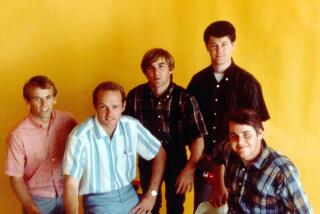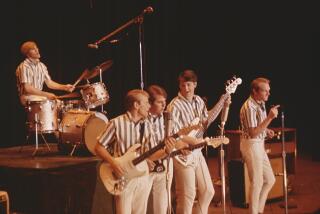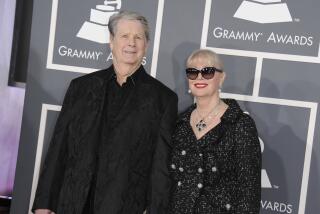Beach Boy Wilson Rides a ‘60s Wave
- Share via
God only knew what to expect when Brian Wilson took the stage at the Wiltern Theatre on Saturday to play his first full concert in his hometown. The creator of the Beach Boys’ music is the centerpiece of pop music’s longest-running melodrama, a walking wounded whose ability to function at all, much less headline a concert, has often seemed in doubt.
This troubled genius invented a genre (surf music), then out of nowhere challenged the Beatles for creative supremacy in the mid-’60s, when “Pet Sounds” blew even the Fab Four’s minds. But after producing a body of startlingly imaginative music, Wilson faded away in a series of withdrawals and breakdowns.
His long struggle for footing has been closely--often morbidly--watched and widely documented. Exploited and dysfunctional, he released some spotty solo albums starting in 1988, but it didn’t amount to much of a career. After a series of “Brian is back” proclamations that didn’t pan out, fans have learned to keep their expectations in check.
Well, Brian is back, or at least as back as he’s likely to get.
On Saturday, Wilson didn’t present his new solo music as much more than a token ingredient to keep the set from being entirely oldies--though one song, 1998’s “Lay Down Burden,” met the challenge of Wilson’s dedicating it to his late brother and bandmate, Carl Wilson, who died of cancer last year.
*
But even though the career survey was drawn virtually entirely from the music he made in the ‘60s, it offered fresh rewards. For one thing, his legacy has never been fully and properly represented on stage by the Beach Boys, and Brian himself has never been able to bask in it. So who’s to complain if much of the show was carried by the 10 musicians behind him, who executed his music with all the care and spirit it merits?
The evening opened with a 20-minute documentary film that condensed the saga, including some hopeful sequences of Wilson, 57, with his new wife and baby daughter. It was a cheap way to build intimacy with the performer, but if anyone’s earned the right to a cheat sheet, it’s Wilson.
Perched front and center at an electric piano, Wilson sounded shaky in pitch and intonation on some of his exposed ballad vocal lines, but soon he was punching out those familiar Beach Boys nasal leads. By the evening’s final song, both his voice and his presence had a genuine strength as he offered the closing “Love and Mercy,” a benediction from his second solo album.
It’s not exactly that he became looser as the show want on. But his tightness--his unchanging, knitted-brow expression, the fast, mechanical way he delivered his patter and jokes--somehow took on a warmth over the two hours, ultimately generating a goofy charm.
There was no mention of the special occasion of the homecoming, but spontaneity wasn’t really in the cards. For this longtime stage-fright victim, it was enough to bear down on the comments and songs that have obviously become comfortable and familiar for him.
Beyond being a bracing reminder of the joy of vocal-based pop, the heart of Saturday’s show was a reassertion of Wilson’s artistry. This unschooled sonic visionary took the Four Freshmen, Chuck Berry and Phil Spector and added his own naive audacity, extending the possibilities of pop music as few individuals have done.
*
The exuberance of the Beach Boys’ early celebrations of teenage action had a flip side for Wilson--an uncertainty, a sense of threatened innocence, an almost pathological dread of leaving adolescence. His genius was to convey this entire range of feelings in music that was eccentric and sophisticated, yet pure and catchy enough to be hugely popular.
The lonely, suburban-primal ballad “In My Room” came early in Saturday’s set, in a stripped-down, four-voice arrangement that upped the evening’s emotional stakes and served notice that this wasn’t a night of nostalgia.
It’s nostalgia if the music carries only memories. If it still delivers insight, truth and joy, and it still sounds as fresh as the first time you heard it, it’s something else altogether, something called classic.
More to Read
The biggest entertainment stories
Get our big stories about Hollywood, film, television, music, arts, culture and more right in your inbox as soon as they publish.
You may occasionally receive promotional content from the Los Angeles Times.










